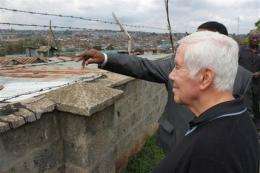US team tours Africa to boost bioterror safety

(AP) -- U.S. Sen. Dick Lugar peered over the 4-foot cement wall and thin strands of barbed wire that separated the deadly pathogens in Kenya's top research lab from the thousands of homes with rusted tin roofs that make up Nairobi's largest slum.
Lugar and Pentagon officials on a three-nation biological weapons security tour of East Africa on Friday were worried that the dangerous pathogens are within fairly easy reach of terrorists.
"Unfortunately in this world there are a great number of terrorists who, whether individuals or organizations, have given a great deal of thought to how you use the very dangerous biological materials to harm others," Lugar said. "Our objective today is to negate the possibilities."
Lugar this week toured sites in Uganda, Burundi and Kenya where diseases like ebola, marburg and anthrax are stored - pathogens that can be stolen and made into weapons.
Lugar is the co-author of the Nunn-Lugar Cooperative Threat Reduction program that has destroyed nuclear, chemical and biological weapons in former Soviet republics. He now has his sights set on keeping deadly diseases out of the hands of people who would steal and weaponize them. One group that Washington has labeled a terrorist group - al-Shabab, which is linked to al-Qaida - operates in neighboring Somalia.
Andy Weber, a top Pentagon official on the trip who oversees nuclear, chemical and biological defense programs, said the Nunn-Lugar program is likely to contribute several millions of dollars to Africa and later tens of millions of dollars to upgrade facilities.
The U.S. officials and experts like Noel Stott of South Africa's Institute for Security Studies say it's possible that terrorists could try to use biological weapons, but Stott noted that no such attacks have occurred in Africa yet. Terrorists would need scientific know-how to handle sensitive pathogens without infecting themselves and to turn them into weapons.
"We haven't come across any instances where criminals or terrorists have actively sought these agents in African stockpiles," Stott said. He noted that while most African states don't see a biological terrorist attack as a possibility, labs dealing with the deadly pathogens lack safety and security standards.
Stott said some labs don't even keep inventories and that the United States can help prevent unauthorized access to potentially dangerous materials. During the tour that ended Friday, the U.S. team saw that dangerous substances were sometimes carelessly handled.
At the Kenya Medical Research Institute, red and blue garbage bags of medical waste sat next to a storm drain that leads to Nairobi's Kibera slum. A Lugar aide said medical waste in the U.S. would have to be incinerated immediately instead of sitting around.
Lugar, a Republican from Indiana, noted that the laboratory could be vulnerable during times of upheaval - such as deadly riots that followed Kenya's 2007 presidential election, when roving mobs ruled the streets.
The institute's director, Dr. Solomon Mpoke, acknowledged the shortcomings and said that while his facility has not experienced break-ins, attacks or other serious threats he looks forward to U.S. assistance, including a strengthening of the fence near the slum.
Milton Leitenber, a senior research scholar at the Center for International and Security Studies at the University of Maryland, noted that al-Qaida has been active in East Africa, in particular with the 1998 U.S. Embassy bombings in Kenya and Tanzania. But Leitenber, who was not on the tour, said African countries should not divert funds, personnel and effort to "greatly exaggerated U.S. preoccupation with bioterrorism."
He pointed out that millions of people are killed by HIV, tuberculosis and malaria every year, but that only five people have been killed by biological agents taken from a laboratory. Those attacks happened when letters containing anthrax were mailed in the United States in 2001. The FBI concluded that an Army scientist was responsible.
Weber said the Nunn-Lugar biological engagement program will enhance infectious disease surveillance to protect the public from both natural outbreaks and bio attacks.
"We don't want to create hysteria," Weber said. "These labs have worked very safely for a long time and they are attentive to safety and security. We're just trying to bring them to the next level."
©2010 The Associated Press. All rights reserved. This material may not be published, broadcast, rewritten or redistributed.















